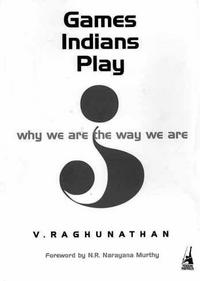
A great book. The author clearly feels that the Indian national character has some fundamental problems – we are free-riders, seek to serve self over society, are way too intelligent for our own good. These traits lead to the phenomena which plague Indian society – things like corruption and it’s general acceptance, unhealthy levels of public hygiene and pollution, the pathetic state of core systems like education, and the tendency to pursue loopholes relentlessly even when they do no good in the long run. These points, while perhaps not representing the complete picture (India has improved a lot, in my opinion) are still very hard to argue against.
He explains this in terms of a game-theory concept called Prisoner’s Dilemma (PD), which is basically a story about how two people have a choice to either co-operate with each other or betray – and it turns out that the overall best case scenario happens to be when both cooperate, although it could be argued that it would seem more self-serving for each to betray. Of course, the link is that Indians tend to betray (society) to achieve personal gains – like throw garbage on the road for personal convenience, or cut queues where ever possible – but which lead to a non-optimal society and thus reduced benefit for all.
The example is used convincingly to address a lot of issues; however the author stops at making any scientific claims (he says in the prologue itself that his ideas are not exactly backed by scientific data but could be valid hypotheses for constructing tests). However, he does talk about studies done to solve PD, and explains that entirely self-serving strategies tend not to do too well.
A classic example that I can think of (though not mentioned in the book) is the use of “water pressure amplifiers” in some communities. As all Indians know, water can be a big problem in India and it’s common for the water pressure to be low during summer. So someone installs this device which, when inserted into the plumbing, amplifies the pressure into your house – at the expense, of course, of slightly decreased pressure to everyone else. Short-term gain for sure – but soon enough everyone’s heard about the device and every household has it’s own. The end result? Back to square one, since there is only so much water pressure available, and everyone is now drawing it equally. Oh, except that everyone has spent a certain amount of money buying the device, and everyone is continuously paying electricity bills for it. And of course, nobody will dare stop using it because if you’re the only one without an amplifier, you can forget about getting any water at all in your house!
In the last chapter, he explains how this modern version of game theory ties in perfectly with ideas conveyed in the Bhagvad Gita. The Gita encourages one to just abide by “dharma” (or right action) – and promises that this will achieve the “highest good” – which is presumably the highest good in terms of society and even the person in the long term. Given a problem like PD, it turns out the most optimal actions are in fact those that are taken in good faith, and not ones immediately self-serving even though plausible arguments can be constructed that one stands to gain more in the short-term by taking the “selfish” action.
A very readable, short book, not only with interesting discussion on game theory but also on the state of India – the work is full of examples of just how much Indians can be self-seeking while ignoring the greater good. At once poignant, humourous and fascinating.
Rating: 4 / 5
One Comment